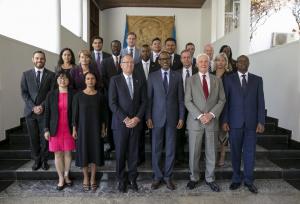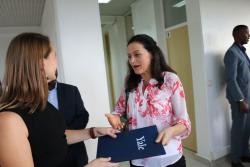The Spirit of Rwanda
By: Lisa Dale, YCELP Associate Director
The last week of March, I had an opportunity to join Australia’s ADC Forum as part of a trade and investment mission to Rwanda. Michael Roux, a Yale Center for Environmental Law & Policy Advisory Board member and Honorary Consul-General of Rwanda, was my connection to the group, and our delegation also featured Major General Michael Jeffrey, the former Governor-General of Australia. With twenty participants, our group consisted of many with ties to the private sector, a smattering of academics, and others with cultural connections to Rwanda. We had just one week in the country and our itinerary was tightly scheduled to include meetings with Ministers, visits to historic sites, opportunities to see civil society in action, and connections with emerging businesses.

My interest in the trip was two-fold. First, my academic background includes dissertation research in Ethiopia and I have a deep affection for that part of the world. The chance to see another country in East Africa and to travel with a highly organized group of professionals was appealing. Second, YCELP has three projects with a nexus to Rwanda: 1) the Environmental Performance Index (EPI) ranks all countries on their environmental performance across two dimensions: environmental health and ecosystem vitality; 2) in partnership with UMass Boston, we are exploring connections between EPI scores and participation in international environmental conventions through the Project on Environmental Law Effectiveness (PELE); our pilot study focuses on six East African countries including Rwanda; and 3) our work with the United Nations’ Anticipate, Absorb, Reshape (A2R) initiative explores the current state of climate readiness in 114 vulnerable countries, including Rwanda. I joined the delegation with the hope of sharing our preliminary results and learning from environmental experts in the country.
The 1994 Rwandan Genocide looms large for any visitor to the country. On our first full day, we visited the Genocide Memorial and participated in laying a wreath in remembrance. The outing served to set the stage for the rest of the week’s dizzying activities, and reminded us that the gruesome history that pitted neighbor against neighbor was within our lifetimes. Rwandans today carry that tragic history close, and seem to have accepted the catharsis that was fostered through a ground-breaking reconciliation process. As a newly born country, Rwanda is carefully reforming its institutions to prevent another atrocity from taking hold.
That same energy of working together to create something entirely new was apparent in every meeting we attended. Government workshops included separate small group conversations with the Ministers (and their staff) of Infrastructure, Energy & Water, Agriculture, Natural Resources, Mining, and Education. In every instance, the Rwandan teams were welcoming, enthusiastic, and curious to hear from their guests. On our last day, we entered the Presidential estate and sat in the cabinet room, where we met with President Kagame. Gracious and welcoming, he spoke of the importance of integrating foreign investment into the country’s economic portfolio, and was receptive to comments about sustainable development and environmental protection.
For me, the long-term connection that is likely to prove most durable is through the University of Rwanda. With a firm focus on science and math, the system of higher education in the country is training a new generation of engineers. Social science perspectives on resource development, however, seemed thin when we visited, and I heard significant interest in partnering with U.S. schools to share coursework and research expertise regarding policy topics. Yale’s School of Forestry & Environmental Studies (FES) already has strong connections to Rwanda – through Amy Vedder’s long-term gorilla research and Parfait Gasana’s graduate work. It seems that this visit was another opportunity to broaden the Yale network and strengthen YCELP’s presence in serving as a platform to explore environmental law and policy at the international level.
